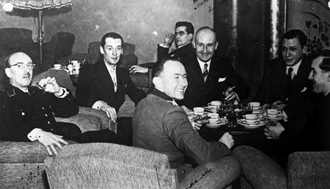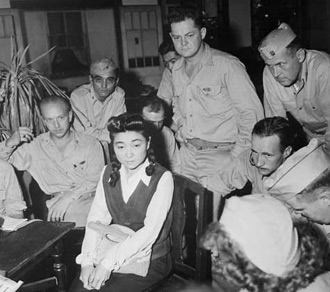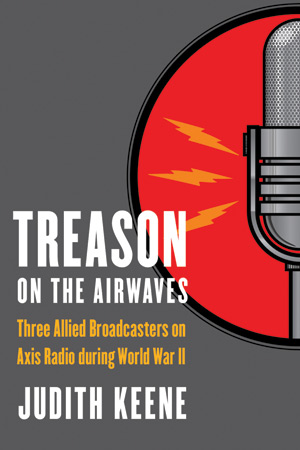
Traitors in wartime have a long history. During World War Two, both Allied and Axis governments used enemy nationals to broadcast propaganda. When the war ended, the victors prosecuted a number of their own citizens for treason.
My book tracks the vivid experiences of three individuals who broadcast on Axis radio and later were tried as traitors. Although the treason laws in Britain, Australia and the United States were much the same, and the behavior of the three appeared similar, the outcome of their trials was determined by a conjunction of popular emotion and post war politics.
John Amery was executed in London in December 1945. His father, Leo, a long-standing member of the British Parliament, was a figure of great gravitas in Conservative and imperial circles. It was he who made the rousing speech that brought down Chamberlain’s administration in May 1940 and ushered in Churchill’s wartime government, in which Amery served.
There is no doubt that between 1940 and 1945 John Amery hitched his star to a Nazi victory. In France when war broke out, he joined a motley cavalcade of anti-Semitic, pro-German propagandists spruiking the power and the glory of the “New Europe” under Nazism.
Not surprisingly, these broadcasts, especially those beamed to Britain, caused his parents great pain. On air, John invariably railed against the “Jew-lover” Churchill and derided King George VI as “that stammering idiot” and the “living proof” of English degeneration.
At the end of the war, British Intelligence brought Amery back to London where he pleaded guilty to High Treason. This “honorable act” as his father called it—perhaps his only one—saved the family the ordeal of a long trial. Equally, it avoided the public catalogue of the son’s disreputable doings that would have reflected badly on his younger brother, Julian, who ran on a Conservative ticket, with Churchill’s son, in the khaki elections immediately after the war.
Charles Cousens, taken into Japanese captivity at the fall of Singapore, was a well-known broadcaster on Australian commercial radio.
The Japanese military until very late in the war was convinced that “winning the thought wars,” as they termed the new medium of radio propaganda, was an essential element in military strategy. Consequently, Japanese officers trawled the POW camps and holding pens across the Pacific, ferreting out anyone with radio experience.
From mid 1942, and with a band of Australian and American POWs, Cousens created a lively music program that was beamed from Tokyo to Allied fighting men across the Pacific; and to their families in the United States and Australia. Probably the only truly popular propaganda program on Axis radio anywhere, Zero Hour specialized in new American music, pop, the big bands and jazz. Intermittently, as well, broadcasters read lists of POW names and occasional messages, some genuine, most invented, to families at home.
As a captive of the Japanese, Cousens clearly had no real choice about whether to broadcast or not. Equally though, he was a gifted radioman and enamored with the new mass medium. At the end of the war, one of the very few Allied broadcasters in Tokyo to be charged with treason, he faced trial in Sydney in a blaze of publicity at a time when Australians were inflamed by anti-Japanese hatred. Although he was found to have a case to answer, in September 1946, the complicated legal relations that then existed between Australian states and the federal government resulted in Cousens being no-billed. That is the government prosecution declined to proceed with a treason trial in the higher court.
Iva Toguri, better known by the sobriquet “Tokyo Rose,” was chosen by Cousens from the Radio Tokyo typing pool to be the female disc jockey on Zero Hour. She had grown up in Southern California; her father owned a grocery store in East LA. Having just graduated from UCLA, she was sent to Japan to learn the language and meet the relatives. At the time of Pearl Harbor, Iva was one of more than fifty thousand young foreign-born Japanese, mostly North Americans, who were stranded in Japan.
According to all who knew her, Iva was the all-American girl. Hair cold waved, she wore a plaid skirt and saddle shoes and her speech was peppered with American slang. Throughout college she and her sisters enjoyed nothing better than to roll up the living room carpet and jitterbug.
Throughout the years in wartime Japan, Toguri never relinquished her American citizenship, though she was placed under considerable pressure to do so. Cousens, who gave evidence for the defense in her later treason trial in San Francisco, testified that she had given constant aid to the Allied POWs, including himself, whom she worked with at Radio Tokyo. Iva claimed that she had never stopped praying for an American victory so that she could return to her family in the United States. The Toguris themselves spent the war years interned in Nevada.
Iva was convicted on a single charge of having broadcast in favor of the enemy. It was very curious because the incident cited in court took place during the Battle of Leyte, in which America was victorious. It made no difference to the verdict that there were more than thirty other North American-born women also broadcasting over Tokyo shortwave. Probably half that number again was involved with programs relayed from other Japanese stations across the Pacific. None of these broadcasters was charged. Indeed, at the end of the war most of the American-born Japanese working at Radio Tokyo simply applied to the American embassy for new papers and returned the United States to resume their pre-war lives.
After serving seven years in a ten year sentence, Iva was paroled but remained in a terrible legal limbo. She was officially stateless, having been stripped of her citizenship as a convicted traitor, but remained an American by birth. In a different political era, Gerald Ford pardoned Iva Toguri in his last day in office in January 1977.

“Although the treason laws in Britain, Australia and the United States were much the same, and the behavior of the three appeared similar, the outcome of their trials was determined by a conjunction of popular emotion and post war politics.”
As a child after the Second World War, I had often heard the grown ups talking about “Tokyo Rose,” the husky-voiced Japanese siren who supposedly taunted our soldiers in the Pacific with salacious stories about the sexual high jinks of their wives and girlfriends at home. I was profoundly shocked that anyone could be so wicked. In the family’s story-telling, my favorite uncle’s marriage difficulties and post war problems were somehow tied up with this terrible woman.
Of course I knew only the mythologized story that had little relation to the real Iva Toguri. And it had been exaggerated and elaborated in the telling and retelling. When war was declared my uncle immediately joined up and was fighting in Malaya.
Though it now seems almost inconceivable, all contact with these British and Australian military units was lost in early 1942, when Singapore fell. Neither government or families had any idea where these men were or whether they were alive or dead.
My grandmother heard that the names of prisoners of war in Japanese captivity were read from time to time over Japanese shortwave. In an era in Australia when radios were not common, she bought a short wave set so that she could tune in to Radio Tokyo. Although it was forbidden by the Australian government, as it was by the American, she spent every evening glued to the set in the hope of hearing some word of her son. She never did. But she carefully noted any names that she could catch over the airwaves in order to pass the information on.
Nothing was heard of my uncle until he came home at the end of the war, skinny as a scarecrow and never again quite himself. He had spent the intervening years as a POW slaving on the infamous Burma railway.
I came to this wonderful topic via the Spanish civil war. While writing a book about the European extreme right and Franco’s Spain, I kept coming across references in the archives to John Amery. Like his father and his brother, stout Franco supporters, John spent a good deal of time during the Spanish civil war, in Nationalist Spain. He dabbled in a whole range of nefarious business activities within the ultra rightist circles that were drawn to Franco’s cause. In Burgos, John made many of the pro-Nazi connections that he took up with such relish in Europe once World War Two began.
Treason and broadcasting then led me to the very different examples of Charles Cousens and Iva Toguri. Once begun, the research was riveting. I found, and still find, these vivid individuals and their remarkable lives as engrossing as is the very best cinema. Indeed, I think that each of the narratives—or rather Amery separately and Toguri and Cousens together—are the stuff of marvelous movies.
The chapter entitled “Iva Toguri and the Trial of Tokyo Rose” raises profound questions about the operation of post war justice and particularly the pernicious influence of the Japanese-American community in turning a collective back to Iva and her mistreatment and trial.
By contrast, the heroes of the courtroom were the three defense lawyers. All waived their fees. They were led by Wayne Collins, the founder of The American Civil Liberties Union in Northern California and a tireless advocate for the rights of Japanese internees.
Toguri’s defense trio faced the large and well-funded government prosecution team. That included two assistant attorney generals, two extra lawyers, and a back up of designated FBI agents. Plus, J. Edgar Hoover had sent out a general call across the FBI that agents should collect whatever incriminating material they could dredge up on Toguri and her family. In addition, the prosecution brought at least twenty witnesses from Japan to testify against her.
The penurious defense, by contrast, was denied any court support to bring witnesses. But even so, Collins and his associates, with great skill, were able to show the flaws in seven of the eight treason charges raised.
The other notable feature of the trial was the absence of any community voices for Iva from Japanese Americans. Her father came to court every day, but there was nobody else. The members of the Japanese-American community studiously ignored Toguri and her trial. Or, even worse, berated her as a traitor who had brought disrepute on all Japanese Americans.
Certainly, for them, the immediate post war years were difficult. At the time, leaders of community groups, like the Japanese American Citizens League (JACL), were bent on raising American awareness of the hardships the internees had suffered and their consequent entitlement to compensation. These claims were carefully framed as matters of American justice for Americans of Japanese descent. JACL leaders and the editors of local Japanese-American newspapers consciously avoided the thorny matter of Japanese brutality towards prisoners in the Pacific War in favor of the new discourse that propounded, quite correctly, the suffering of Japanese Americans as victims of racism in America.
Toguri’s figure and her trial suggested the contradictions in both positions. Twenty-five years later, the JACL formally apologized to Iva Toguri for their reprehensible behavior at the time of her trial, and the mean-spiritedness they had shown towards her in the subsequent years.

“I found these vivid individuals as engrossing as is the very best cinema. I think that each of the narratives—or rather Amery separately and Toguri and Cousens together—are the stuff of marvelous movies.”
In their variegated contexts, racism was the catalyzing factor in each of these micro-histories. John Amery and his anti-Semitic confreres understood so little about human existence that they imagined that Jews were the source of the world’s problems. Iva Toguri and her generation of Japanese Americans were excluded from full acceptance in their own place of birth on the West Coast but were never at home in Japan. Many Australians and Americans of Charles Cousens’s generation accepted with equanimity that the price of ending the Pacific War was that the citizens of Hiroshima and Nagasaki should be turned to ash.


Judith Keene is an Associate Professor in the History Department at the University of Sydney, where she teaches and writes about war and culture and film and history. She is currently writing a cultural history of memory and the Korean War.